Is an Inclination to Worry Genetic, or Can It Have Roots in Childhood Experience?
I worry, certainly more than my husband worries. It's not a constant state. When things are going well I'm peaceful. If there is trouble, I tend to roll with the punches. When I'm stuck in traffic, for example, I don't fret. Even incidents that would bother most people, are generally inconsequential to me.
For instance, there was the time a colleague at work backed into my car--while I was in it! We both got out of our cars. She was very upset and apologetic. To me it was just a dent in a not-very-new car. I reassured her, didn't seek compensation and calmly drove away.
Traffic Near Midway Geyser Basin, Yellowstone Park, USA

Public domain, Jim Peaco,US Park Service
And yet, if one of my children is sick, even with a 'routine' ailment I fret. There are no routine illnesses when it comes to my family. If a family member is traveling, I think of everything that could go wrong. I see danger, when that is a remote possibility.
If a snowstorm is impending and it seems we might lose power, I'm distressed. I charge the phones, ready auxiliary battery devices and take out candles--though I have many high-powered lanterns and a supply of batteries on hand. I do not relax my vigilance until the storm has passed.
I am aware that my reaction to certain stressors is often inordinate. I have wondered why some people, like me, are inclined to worry, to think about what might happen. And then there are others, like my husband, who don't see threats unless they are immediate and concrete.
Physiological Response to Stress
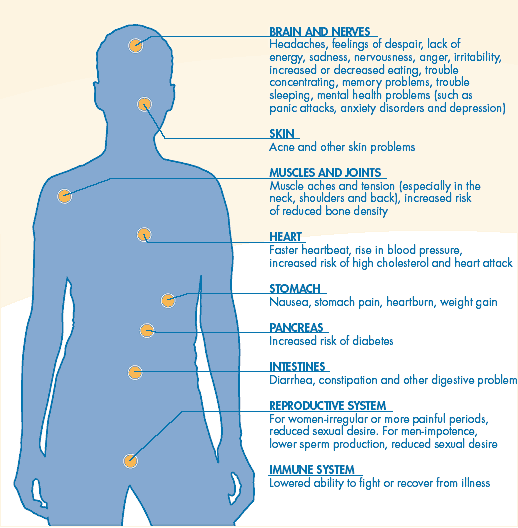
Gdudycha on Wikimedia Commons. Used under CC Attribution Share-Alike 3.0 Unported license
I decided to do some reading (don't I always?) and see if I could enlist science to explain why some of us are worriers and some are not. I looked at childhood experiences for an explanation. Where I did not look was in those circumstances that are truly catastrophic. Children who grow up in conflict zones, for example, 400 million of them, or those who live through famines--7,934,357. Or, those who experience extraordinary events such as being the victim of a kidnapping.
The stressors considered in this blog are those that largely go unnoticed, stressors that are folded into the routine of life (although, of course, when experienced they don't feel routine).
Worry
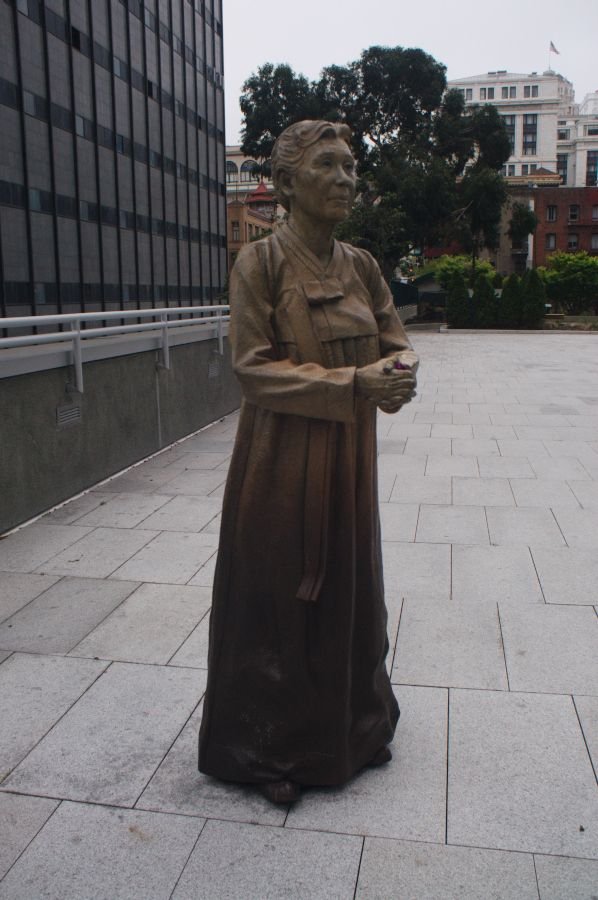
Statue by Steven Whyte (?). Picture credit mliu92 from San Mateo. Used under Creative commons 2.0 generic license.
Most of what I learned about the effect of stressors on children lines up pretty much with what I expected. But there were some mildly surprising findings. For example, heredity seems to play a rather minor role in the development of long-term effects on personality, especially the development of an anxiety-prone personality.
I made a chart to help track factors in childhood that might contribute to a stress-prone personality in adulthood.
Factors Possibly Related to Development of Stress-Prone Personality
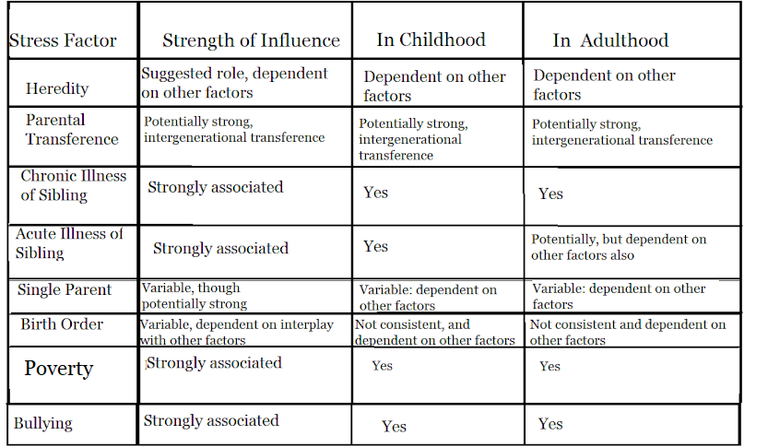
Credit:@agmoore
Here is a brief discussion of each listed factor:
Heredity
When addressing the heritability of an anxiety-prone personality, I had to settle for articles that addressed generalized anxiety disorder, which is pervasive and interferes with the ability to carry on daily functions of life. Even in that case, heritability is described as being related to PRS, polygenic risk scores...that is a combination of genes that are believed to present a predisposition to the development of anxiety.
In contrast to the association between PRS (polygeneric risk scores) are the effects of environment, which seem to be strongly correlated to the development of anxiety. One study, for example, found that discrimination presents a greater risk to the development of anxiety and related disorders than does "genetic liability alone".
Parental Transference
Often, what seems to be an inherited (genetically based) personality trait is actually the result of parental transference. There is strong evidence that anxious parents pass on this trait to their children through environmental exposure. The exposure may even extend to stress experienced by the mother during pregnancy. Studies show that in situations where the mother and child are not biologically related (i.e. in vitro fertilization) anxiety in the mother still influences the development of anxiety in the child. There are other discernible personality and physiological effects evident in the offspring of a mother who is stressed during pregnancy.
Brain Regions Affected by Stress
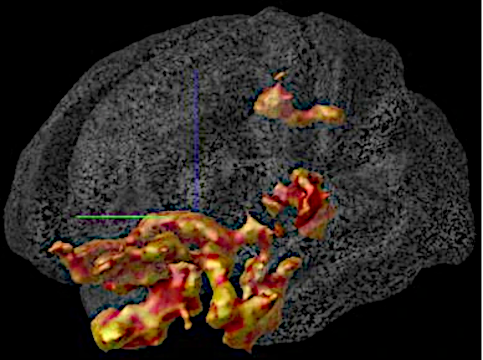
Credit: From the article Neuropathology of Stress.Lucassen, P.J., Pruessner, J., Sousa, N. et al. Neuropathology of stress. Acta Neuropathol 127, 109–135 (2014). https://doi.org/10.1007/s00401-013-1223-5. Open Access: Creative Commons Attribution License which permits any use, distribution, and reproduction in any medium, provided the original author(s) and the source are credited.
Interestingly, it is suggested that both the stressed mother and sperm from a distressed father may have an impact on development of the fetus. The stress-associated harm may also be related to quality of care given to an infant postnatally.
One study on parental transference focused on the children of Holocaust survivors, but also extended to groups of people with "less extreme forms" of stress. This study concludes that there is "significant... evidence supporting the hypothesis of parent to offspring stress". However, there is a need for much more research in this area.
Chronic Illness of Sibling
An article out of Turkey that appeared in the Turkish Archives of Pediatrics, describes the global impact that a child's illness has on the family. According to this study, the degree of impact is influenced by the severity of the disease and the family's ability to cope with it. Healthy siblings of a chronically ill child experience "different emotions including withdrawal, aggression, depression, anxiety, guilt, confusion, and isolation."
The greatest number of studies in this area have been done on the families of children treated for cancer and also on those children who suffer from severe development issues.The effects of living with a chronically ill sibling may extend into adulthood.
A Sick Child Sitting on Her Father's Knee Whilst her Mother Prepares Some Soup
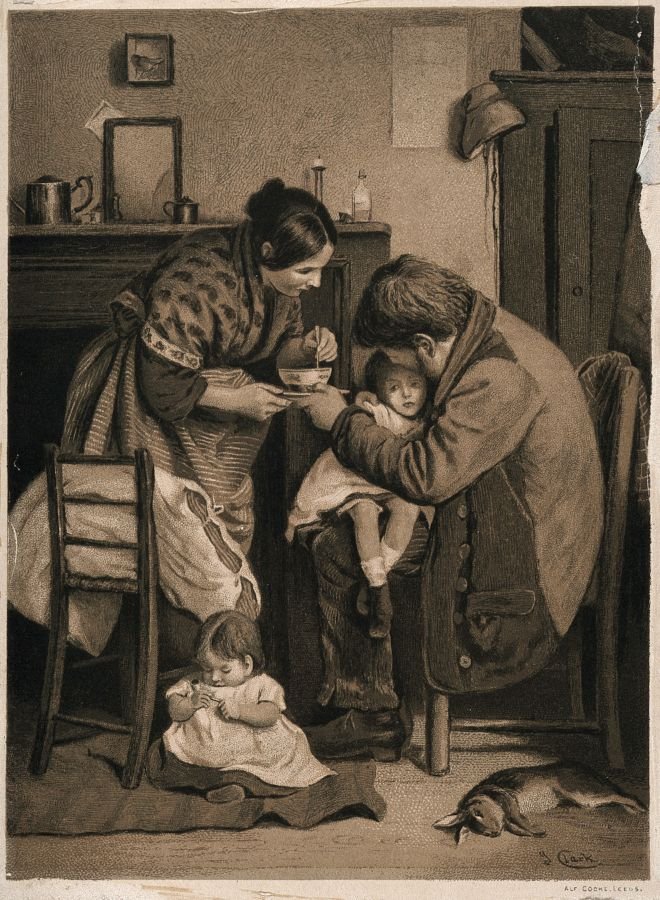
Wellcome Collection gallery (2018-03-22): https://wellcomecollection.org/works/vtwemcmu CC-BY-4.0
Acute Illness of Sibling
An acute life-threatening illness in one child has both physiological and psychological effects on parents and siblings. A hospitalization exacerbates the level of stress. Siblings of the acutely ill patient demonstrate a host of effects, including depression and anxiety. Among the consequences on the siblings is a disruption of their relationship with parents.
An article in the Journal of Child Healthcare addresses the impact of childhood life-threatening illness on siblings. It concludes that anxiety and depression are among the psychosocial changes experienced by siblings. The degree of disruption seemed to be related to the sense of control a child felt he/she had on circumstances.
Single Parent
Articles that deal with this issue tend to reflect evolving social conditions. Older articles emphasize the negative impact of single parent homes. More recent articles tease out the emotional impact of having a single parent apart from the consequences of having a divided home, for example: reduced income.
A Young Widow Has Had the Door of Her Cottage Sealed Against Her
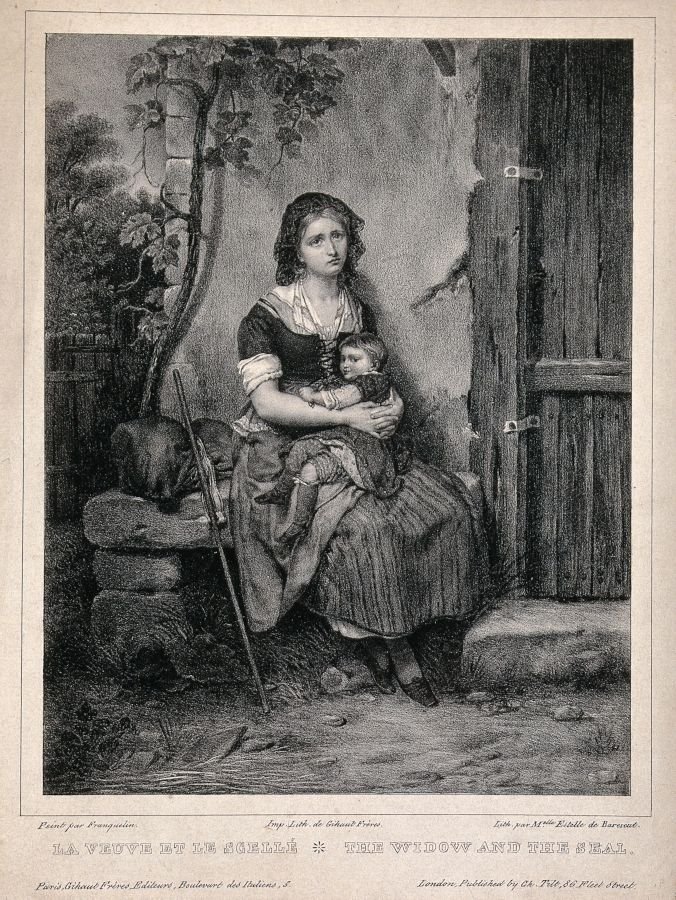
Estelle de Barescue. Wellcome Collection gallery (2018-03-23): https://wellcomecollection.org/works/mx4szbkj CC-BY-4.0
A 2023 article from India stresses the potential negative impact of a single parent home, and then discusses the potentially positive effects. The negative impact would be a sense of loss, depression and anxiety. The positive effects would be a sense of responsibility and sense of community with the remaining parent.
Likewise, an article from Purdue University in the US, parses the effects of single parenthood from its practical consequence: less money, poorer schools, less prestigious neighborhoods, an absent parent who has to work long hours, and a parent who is not able to participate fully in the child's activities because of work commitments. When these consequences are neutralized by either supportive family or other means, the long-term negative impact of single parenthood fades.
There is, however, a short-term effect of parental separation on children. As an article in Very Well Family suggests, within a year or two after separation, though, children bounce back if there is support for the single parent.
Birth Order
The effect of birth order on a child's psychosocial development--particularly on the development of anxiety--is often discussed in terms of Alfred Adler's theories on child development.
Three Siblings From the 1890s
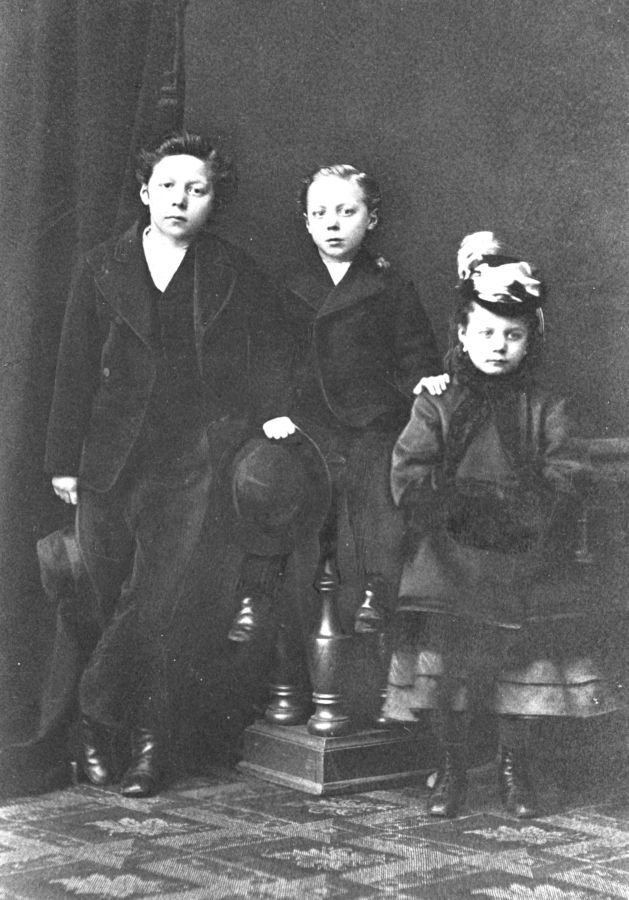
Unknown author. Public domain.
Of the seven stress factors in my chart, this one is the most confounding. There is little agreement about the consistent effect of birth order on the development of anxiety, or any other personality trait. Some studies find that the first born has the highest self esteem. Some find that the last born has the highest self-esteem. The same study reports research that suggests last born have high levels of anxiety. A paper out of Western University suggests first-born have highest levels of anxiety.
These findings, as inconsistent as they be, are confounded further by something called psychological birth order. If children are spaced far enough apart, it seems biological birth order is thrown out the window and something called 'perceived birth order' prevails.
It may be that birth order matters, but its significance varies so much from family to family that I find no value in this metric.
Poverty
It's hardly a surprise that poverty by itself, without other stressors, is a cause of immediate and long-term anxiety. "Higher levels of anxiety and depression are well-established among kids growing up in families with lower income," researchers report in the Harvard Gazette. They add that there are "also well-replicated differences in brain development as a function of a family’s socioeconomic status".
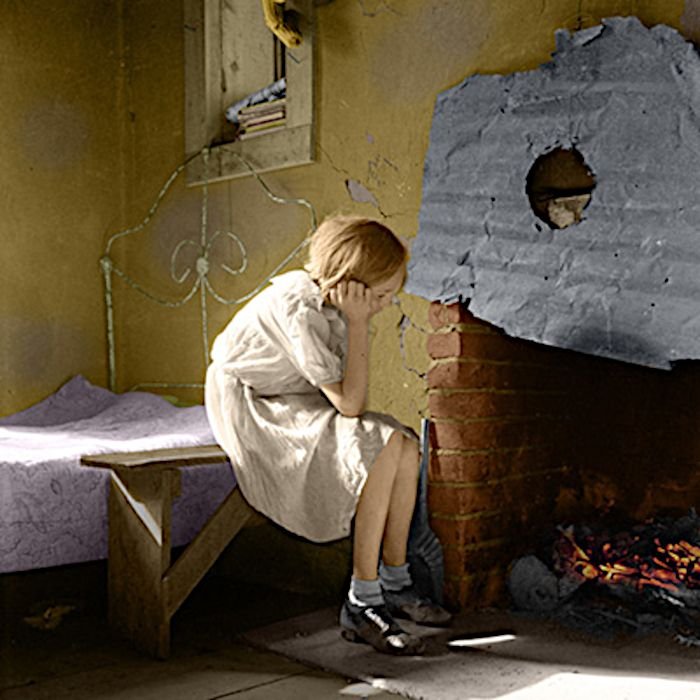
Dorothea Lange. Work of a government employee, public domain.
Another article, from the American Journal of Public Health, found that exposure to poverty resulted in elevated incidence of depression and anxiety. This effect was evident in 14 and 21 year follow ups of individuals in the study. The authors of the article conclude: "The more frequently the child was exposed to poverty, the greater was the risk of that individual being anxious and depressed at both the 14- and 21-year follow-ups."
Of the seven stress factors in my chart, poverty had the strongest correlation with the development of long-term anxiety.
Childhood Bullying
Articles I read reinforce the idea that bullying in childhood has long-term psychological consequences. An article from the Social Psychology of Medicine found that in college students, childhood "bullying victimization significantly predicted greater levels of depression, anxiety, and post-traumatic stress (PTS) after controlling for other childhood victimization experiences".
Demonstration of Bullying, U. S. Air Force
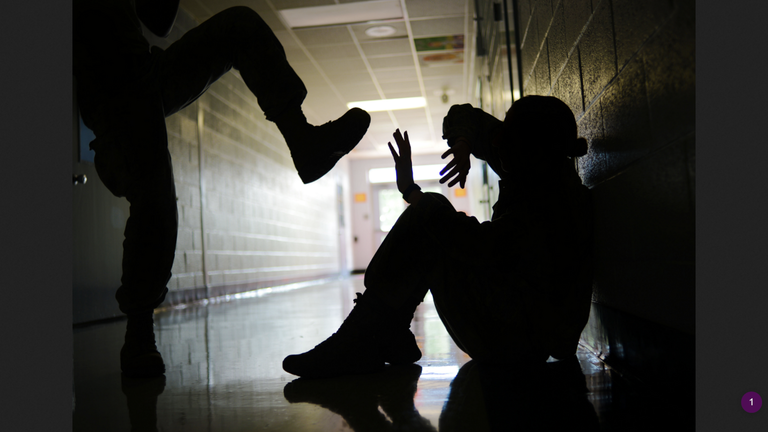
Senior Airman Tabatha Zarrella. Public domain
Another article in Traumatology (there is a journal for everything, isn't there?) found that college students with memories of being bullied attibute to the bullying, "high levels of shame, anxiety, and relational difficulties as adults".
Bullying, along with financial hardship, ends up being one of the strongest elements correlating to the development of long-term anxiety.
This was a sort of tongue-in-cheek exercise in looking for reasons behind my inclination to worry. However, there was a serious side to this exercise. As I read the articles, implications of the findings were unavoidable. So much of what leads to adult anxiety--which is a source of suffering and also loss of productive human energy--can be traced to childhood experiences. And so many of those hard experiences can be mitigated by timely intervention.
In almost every instance, community and family support were shown to soften the effects of life stressors. Poverty, single parenthood, bullying--all could be affected by support. Others, chronic and acute illness of siblings, could also be mitigated by timely intervention. Even the parental transference and birth order--these are not fixed in stone. Addressing stress in expectant mothers (improving living circumstances, for example) would be an investment in the future for all of us. As for birth order--parents who are informed about their role in these relationships might soften a biological given.
This blog ran a little long. Don't know if I lost my readers. It's the sort of blog, though, where readers can skip around and read what interests them.
I wish peace, health and calm to everyone.
End Image credit: @yaziris, Pigeon, LIL Gallery of Images
@muelli, Flower, LIL Gallery of Images
https://journals.sagepub.com/doi/full/10.1177/09731342231179017
https://link.springer.com/article/10.1007/s11218-016-9352-z
https://www.cell.com/trends/neurosciences/fulltext/S0166-2236(23)00023-1
https://www.ncbi.nlm.nih.gov/pmc/articles/PMC8689391/
https://www.ncbi.nlm.nih.gov/pmc/articles/PMC6408193/
https://www.ncbi.nlm.nih.gov/pmc/articles/PMC4677138/
https://www.cell.com/trends/neurosciences/fulltext/S0166-2236(23)00023-1
https://www.ncbi.nlm.nih.gov/pmc/articles/PMC9886926/
https://www.bristol.ac.uk/news/2023/april/gene-brainstudy.html
https://link.springer.com/article/10.1007/s11218-016-9352-z
https://ncmedicaljournal.com/article/55046
https://scholar.google.com/scholar_lookup?title=School%20bullying%3A%20Do%20adult%20survivors%20perceive%20long-term%20effects%3F&journal=Traumatology&doi=10.1177%2F1534765607299911&volume=13&pages=16-26&publication_year=2007&author=Carlisle%2CN&author=Rofes%2CE
https://www.ncbi.nlm.nih.gov/pmc/articles/PMC2920957/
https://news.harvard.edu/gazette/story/2023/05/poverty-hurts-young-brains-but-social-safety-net-may-help/
https://homework.study.com/explanation/what-is-the-difference-between-biological-and-psychological-birth-order.htm
https://alphachihonor.org/headquarters/files/Website%20Files/Aletheia/Volume%202%20Issue%201%20Spring%202017/Analysis-of-Empirical-Validity-of-Alfred-Adlers-Theory-of-Birth-Order.pdf
https://ir.lib.uwo.ca/cgi/viewcontent.cgi?article=1014&context=brescia_psych_uht
https://www.ncbi.nlm.nih.gov/pmc/articles/PMC8079750/
https://www.google.com/search?sca_esv=569780891&q=What+is+Alfred+Adler%27s+theory%3F&sa=X&ved=2ahUKEwjmrde31NOBAxVwMVkFHZG_C6oQzmd6BAg0EAY&biw=1600&bih=674&dpr=1.2
https://www.verywellfamily.com/psychological-effects-of-divorce-on-kids-4140170
https://www.purdue.edu/hhs/hdfs/fii/wp-content/uploads/2015/07/s_wifis02c04.pdf
https://www.ncbi.nlm.nih.gov/pmc/articles/PMC9667075/
https://link.springer.com/article/10.1007/s00401-013-1223-5/figures/1
https://doi.org/10.1007/s00401-013-1223-5
https://www.ncbi.nlm.nih.gov/pmc/articles/PMC2830085/
https://www.pnas.org/doi/10.1073/pnas.2017224118
https://acamh.onlinelibrary.wiley.com/doi/full/10.1111/jcpp.13422
https://hostageus.org/hostages/recovery-over-the-long-term/
https://www.unicef.org/press-releases/global-hunger-crisis-pushing-one-child-severe-malnutrition-every-minute-15-crisis
https://www.unicef.org/media/131491/file/%20Humanitarian%20Action%20for%20Children%202023.pdf
By the way, I can trace several of the childhood stressors listed in the stress chart to my own childhood. However, I had a great mother, loving extended family, and some remarkable teachers. Maybe I do worry a bit, but because of the support I received , I lead a full and happy life today.

That makes 2 of us who worry too much
Depending on what I have researched there may be anxiety disorders or super sensitivity to stress either one of the two.
About that parents can transmit greater predisposition to stress is something sad because we are from birth to suffer anxiety.😭😭😭😭
Thank you for reading that very long blog!
Very few parents are perfect. When we have children most of us try our best, but we come with our own baggage. It's a good idea to wait to have children until we know ourselves very well. Very few of us do that.
It's true that the stress of parents is passed on to the children. It's sad. But I think there is a role for others to jump in when a child is obviously in trouble, or comes from a home with trouble. Just one kind person can mitigate the difficulty a child experiences. Sometimes that's enough to hold onto.
I'm sorry you worry too much :)) One of the reasons I wrote this blog was to distract myself from worrying about something that's going on at home. I find it's really helpful for me to get lost in research. Works better than drugs 🌼
I wish you peace, and a less worrying week ahead.
Thanks again for reading and for commenting.
Thanks for the words 😅
Although I suffer from high sensitivity
I inherited it from my mother how lucky I am 😭.
we have to fight for a less stressful life
Thanks for your contribution to the STEMsocial community. Feel free to join us on discord to get to know the rest of us!
Please consider delegating to the @stemsocial account (85% of the curation rewards are returned).
Thanks for including @stemsocial as a beneficiary, which gives you stronger support.
Thank you for your support and acknowledgement. It is very much appreciated.
The way things are going today, due to inflation and many problems in life, every person is in depression and taking a lot of worry and tension due to which his health is not good at all and he. If he gets sick, this time will continue in the same way, so it is better that a person should take special care of his health.
I'm going to tell you a very short story about how fear and worry dominated my mother's life.
I always tried to spend the Christmas holidays with my parents, regardless of where my job took me.
Whether it was by car, plane or train, however I travelled the distance, my mother's words of greeting were always the same: “My dear boy, please don't do this to me any more. I was so worried. Something might happen on the long journey.”
But it sounded like this on the phone when I spared her those fears and didn't turn up for the party: “I'm so worried about you because you haven't come. Are you sick? Or has something happened that you can't tell me about?”
Mum's troubles can't be turned off like a radio.
Thank you for sharing that story. This blog is about what happens to other people we don't know. You have shared something real, that happened to you.
I'll remember that for a long time. You capture the essence of obsessive worrying, and the toll it takes on family.
I appreciate that you read this long blog and that your response was so meaningful.
An enlightening piece as always and no, you didn't lose me along the way. The listed factors all make sense and contribute to anxiety/fear in various ways. The factor of birth order and environment are another aspects I consider to be more prevalent in my part of the world—West Africa.
Whether first or last, every child is held up to a high standard of responsibility and with it comes anxiety. When we don't measure up, the consequences most often involves physical assault like canning (which is termed as discipline) and some other forms of punishment. We grow up with this anxiety/worry/fear which can be debilitating to one's growth (physical, social and mental).
For children who are lucky to have supportive family, affection helps to combat this anxiety...not totally though but better than some individuals. They becomes adults who worry excessively at the slightest thing.
I enjoyed reading this detailed piece. Thanks for sharing and have a great day. !PIMP 😊
You must be killin' it out here!
@kemmyb just slapped you with 1.000 PIMP, @agmoore.
You earned 1.000 PIMP for the strong hand.
They're getting a workout and slapped 1/1 possible people today.
Read about some PIMP Shit or Look for the PIMP District
Hello dear @kemmyb,
Thank you for reading the long blog and responding as you have.
When I was growing up, many years ago in a rural area, it was the custom to punish children with a belt, a switch (cut from a tree to sting when applied) or the hands. My mother suffered disapproval because she used none of these methods. She couldn't imagine hitting her children like this.
I think the corporal punishment meted out brutalized children and made them more likely to be violent themselves. We were a little wild at home, but never had any discipline issues in school or in public. My mother somehow managed to give us what we needed to behave properly, without the beatings.
Caning is terrible. Yes, I can see where it can lead to dread and anxiety in a child, the kind of anxiety that can linger for years.
Thanks again for sharing that information about your culture. It's amazing to me sometimes how different and how similar people are across the world :)
Have a great day, @kemmyb
Yes, I worry. I worry in the same way you do—I’m not in the least affected by things that only concern me, such as someone spilling their milkshake on my skirt. I’m always blasé about things that can hurt “only me”. However, if you try to hurt my dog, mother (I hurt her often, but that’s different), brother, husband, I might kill you. Hehe!
As for scientific reasons, while I respect your research, I think it’s personal. You are what you are despite socialisation or genetics. That doesn’t quite make sense, because we are, also, who we are “made” to be. But, I always wonder what made a “Hitler”, a “Stalin” a “Putin”. If I was brought up in any one of these peoples’ “environments” would I too have turned out a monster? Would I worry, less or more? Would I be who I am or would I be different? Basically, I think I’d be who I am.
I understand that extreme stress can alter one’s trajectory. If a sibling is very ill and the entire family has to live on tip toes because of it, that might very well change your personality. Poverty is also a defining experience that leads to disordered mentality.
Overall, the single takeaway for me is that I read every damn word you wrote. I read it and reread the entire thing and you made me think. You made me look at myself and everything in my ambit. That’s your peculiar and mesmerising talent; you make people think.
Wow! How very extraordinary 🤔🤗🤗🤗❤️💕❤️💕
Yes you do!😇
You're correct, we are who we are. How can we ever unravel the puzzle? And does it matter. But sometimes I wonder, when I see my husband's cool demeanor (it's not natural--but then he did survive combat 😅) and then see that I am frantic, I do wonder.
Thanks very much for reading, and for your feedback. Hive is great for me because I get lost in the research, also in making collages. I feel I'm doing something and focusing on something else is relaxing.
You are really kind. I write from the heart, and then go back and try to make the piece objective. It's gratifying that this worked for you, anyway.
Hope your life is peaceful there, @itsostylish. I know you have your challenges, and that you meet them bravely and creatively.
Take care my friend.
Beautifully written exploration of the constraints that bind the mind. Your research is deep and meaningful and leaves us with questions and answers. It leaves thinking, hard. The most effective result for any provocative piece is how much impact it has. Of course you have that impact and you’ve achieved it by throughly investigating your subject in the most thought provoking manner.
Thank you, @theinkwell. It is kind of you to stop by and I am honored by your critique. When I write, whether it's an essay or a story, I do use tips I picked up when I was curating. That stuff never leaves you.
Thanks again for the support and the kind words.